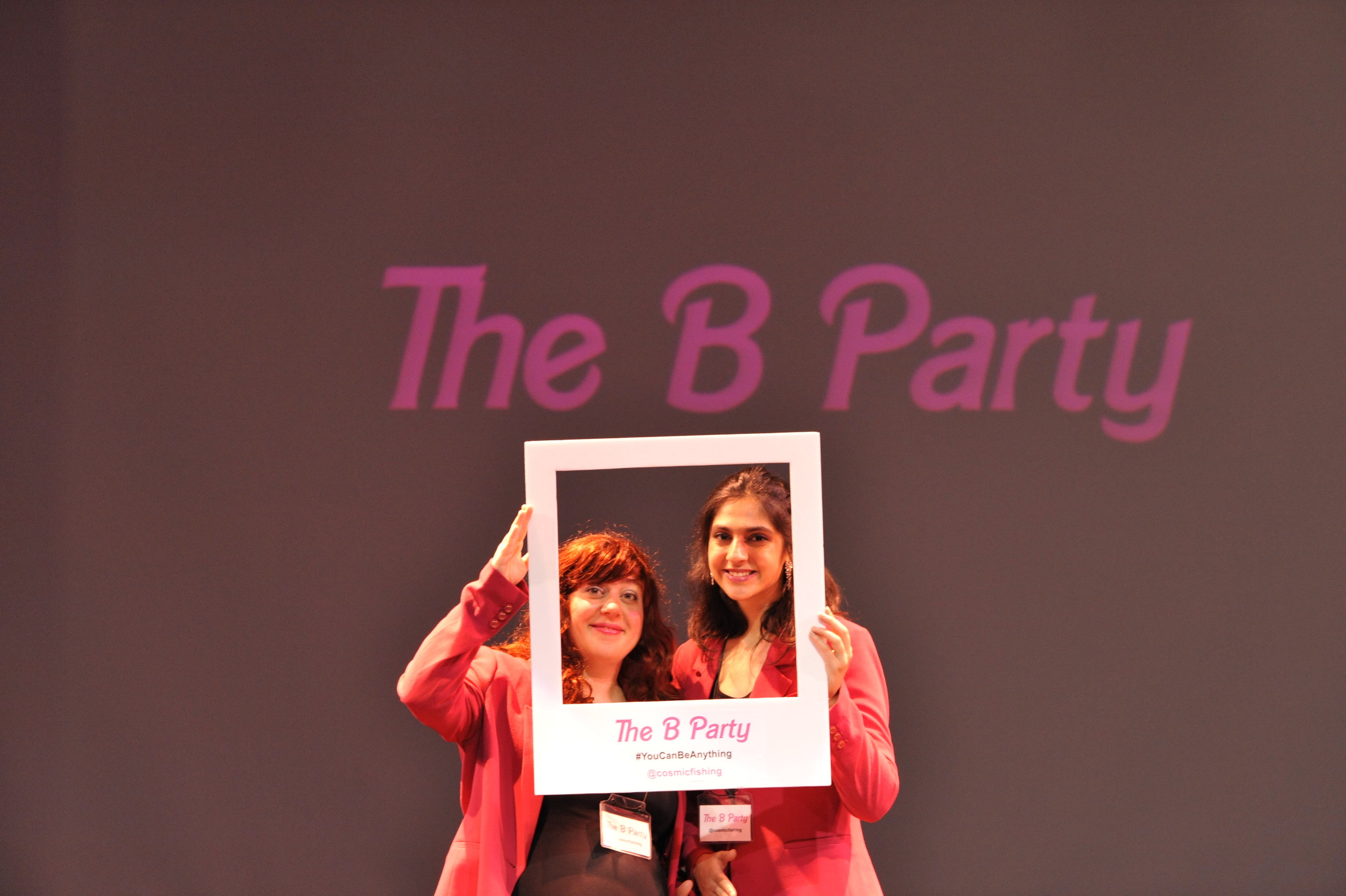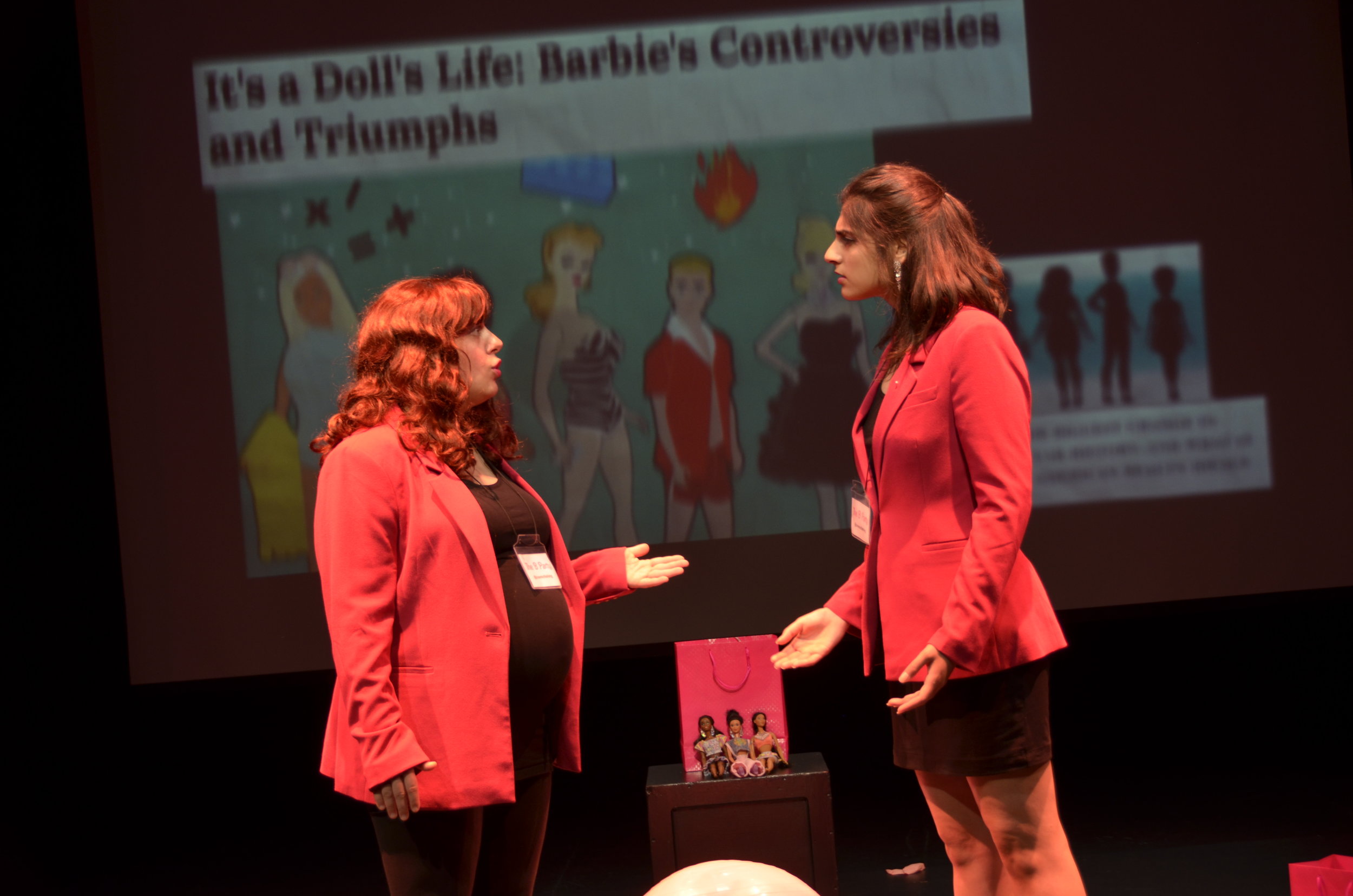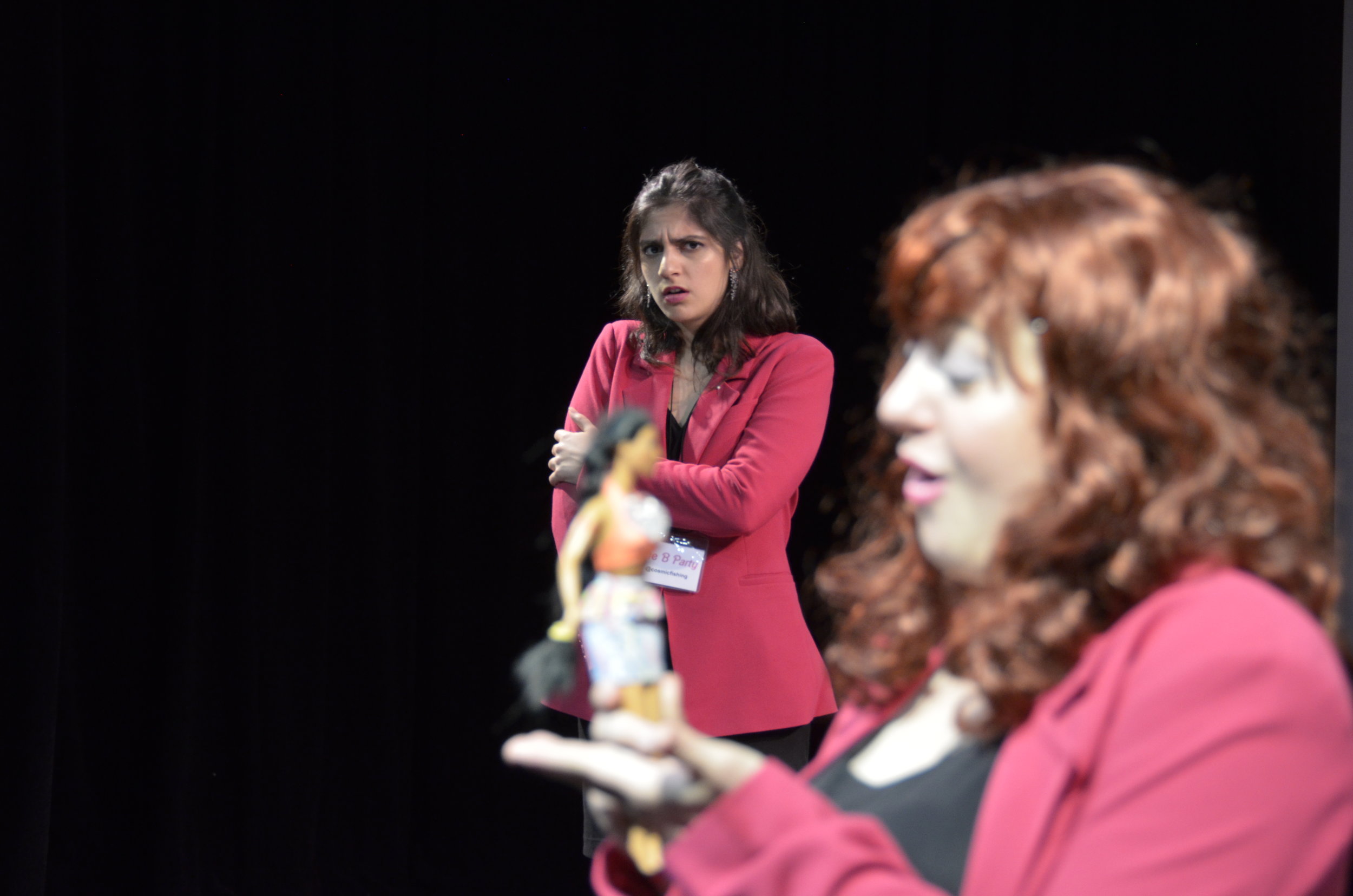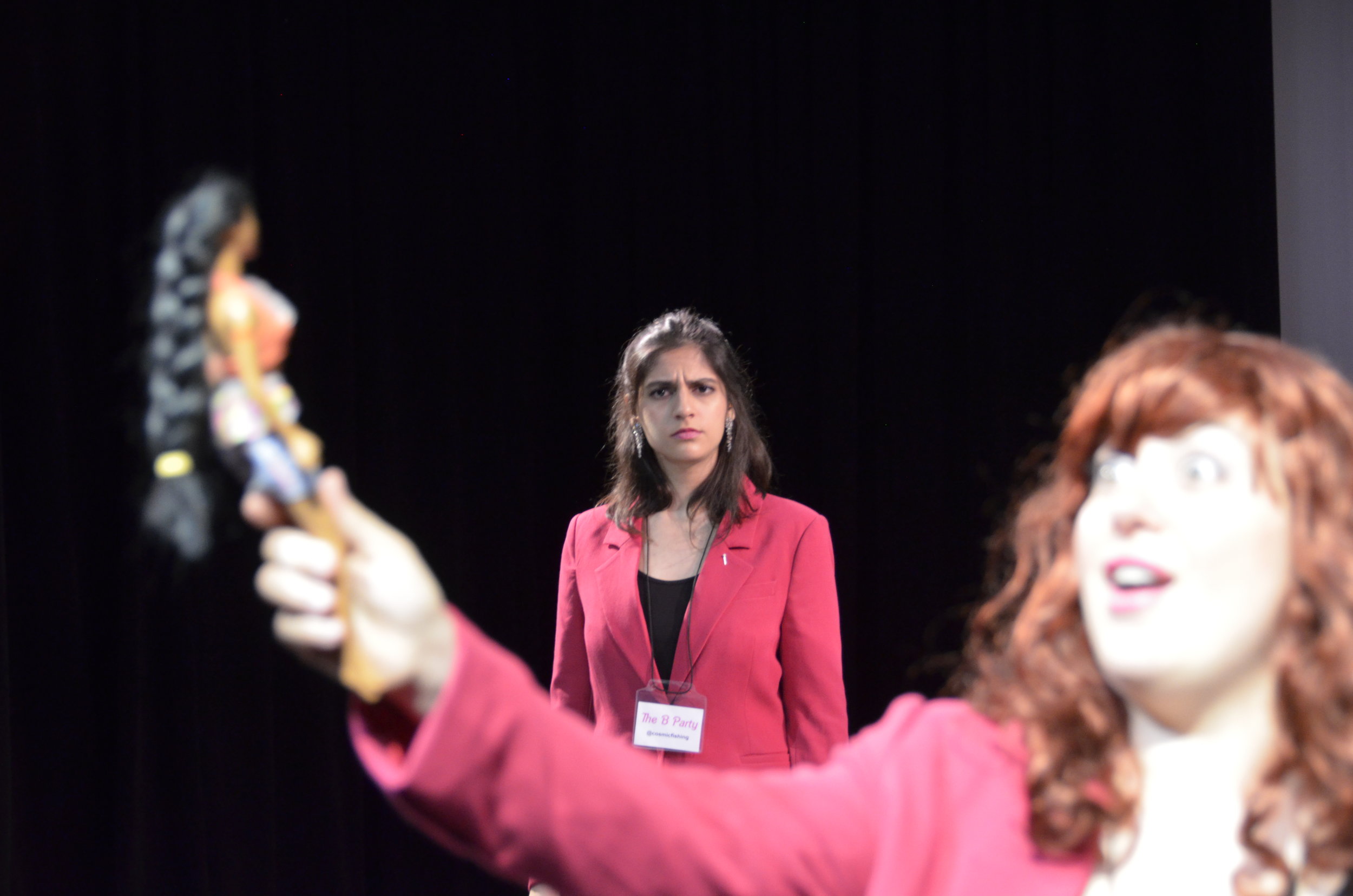What is The B Party? This is an original 2017 performance creation by Viktorija Kovac, showcased as part of Viktorija’s 2017/2018 Artist-in-Residence Term for JM Drama Alumni and The Registry Theatre. In 2018, Andy Houston and Nada Abusaleh join The B Party as co-creators. You may think it’s a performance creation about Barbie, but it's much more than that. It's an opportunity to celebrate how far a feminist society has come, while acknowledging how much work there is still left to do and talk about where we want to go. The performed celebration and conversation occurs in tandem with Barbie the icon. Barbie is a blonde, white, attractive, wealthy, successful American woman who has everything, and can easily do everything. This consumerist and capitalist narrative is being marketed to girls, making them want to attain this kind of life and subconsciously attributing success to looks and image. The B Party looks at the opposite narrative and wonders how we can find a healthy balance. It packages these themes and explores them in a new way. It doesn't aim to solve or resolve any of the issues that the creation raises, but it does provide entry points for the audience to think about and discuss them. For some, that may be unsatisfying, especially in today's world where things are proclaimed right or wrong, with little room for context or further discussion.
Much like Barbie herself, The B Party keeps evolving. In 2017, it was performed twice at Studio 180 at the University of Waterloo, and once at Steel Rails (an annual art party that happens in June, organized by Community Edition). Kovac emphasized to me that while the previous versions were a little more ironic, this iteration of The B Party is the most urgent and relevant to our day to day discussions, current reality, and political climate. Theatre is a way to add to the conversation, test ideas and ask good questions. For example, exploring the ideology in toys and dolls, and how they are used by kids to shape societal perception. In Kovac's case, as an immigrant child, she misguidedly attempted to replicate her world through her toys, like getting her first black Barbie around the same time she made her first black friend.
Kovac's personal story is the foundation laid out for The B Party, but she feels that the themes of The B Party are relevant to other women who are experiencing challenges at different stages of life. She is aware that she has privilege (as a Canadian Caucasian single heterosexual woman in her early 30’s) but also that her privilege has a limit. Her personal setbacks following her academic studies resulted in her not being able to accomplish the things she wanted to. She was unable to use the skills and knowledge that she had and wasn't getting invited to participate professionally in the theatre as a director and creator. Any invitations that did come her way revolved around her doing technical aspects of producing work, without the creative work to balance these commitments. She felt isolated and limited when it came to building projects. As a woman and a theatre director/creator based in the Waterloo Region, if you don't have a side gig, you need to dip your feet into different waters-courses, lots of workshops, just to stay relevant. This prompted Kovac to make a return to the UWaterloo to take courses in her former liberal arts program for two semesters as a mature student and found that being among younger artists and creators reignited her creative fuel and expanded her people resources. In 2015, Kovac started her theatre company, Cosmic Fishing Theatre (@cosmicfishing), out of necessity. She wasn't getting the right opportunities, so she needed to create them for herself. "Who will give you the chance to direct as a woman?" she asked. Therefore, it’s important to her that Cosmic Fishing provides opportunities for emerging theatre artists (like Nada Abusaleh) and established theatre practitioners (like Andy Houston) as a means to break out of the post-secondary bubble and be involved in the wider arts community.
Kovac immigrated with her family to Canada from Belgrade, Serbia (Former Yugoslavia) when she was nine and a half and brought with her a suitcase full of toys. Each family member was allowed two suitcases, and one of hers was full of toys and books, but mostly Barbie dolls. She says that her parents knew that it would be expensive to buy these things when they got to Canada, so they were very intentional with what went into the suitcases, especially for the children. She expressed regret at some of the toys that had to be left behind and reflected on the sad imagery of a little girl and her suitcase full of toys.
Nada Abusaleh is a young performer and artist who recently graduated with a Major in Psychology and a Minor in Theatre and Performance from UWaterloo. Despite a 10-year age gap, Kovac and Abusaleh share connecting cultural reference points. Abusaleh's family are Palestinian, having immigrated from Kuwait to Jordan, then finally to Canada when she was four years old. The immigrant story and tumultuous geo-political climate issues in The B Party resonated with her and she was excited to help develop the work further. Abusaleh says that we often see the broad impact of these issues, but feels it is important to look at the personal impact. She reflected on her older sibling's experiences of coming to Canada, and they were similar to Kovac's. She also played with Barbie dolls growing up and remembers getting her first one as a gift from her father when he returned from a work trip abroad. In the play, as The Assistant, Abusaleh is the voice of the youthful millennial. She brings a fresh perspective and is able to call out problematic issues quickly and knowledgeably, but struggles to consider Kovac’s personal experiences while doing so. Kovac revealed that some of the discussions that came up in the creation process made it into the show.
Left: Abusaleh Right: Kovac
In discussing how the two characters in the show communicate, Kovac expressed frustration that people are being too nice and too polite or are being told to be too nice and too polite and as a result aren't talking about the things they need to talk about and aren't really giving each other the information exchange needed to succeed. This is how the characters in the show communicate, by using tactics to talk around the issues instead of directly addressing them. When I met with Kovac and Abusaleh a week or so before the opening The B Party was still working on how the ending of the play was going to come together. Together they were both clear on wanting to make sure that it would be empathetic and compassionate and were aware that it would be impossible for them to speak for all women. I believe that they were successful in conveying empathy. When I asked what she hoped the audience would take away from the play, Kovac said that she hoped that what they expected is not what they got and that they would walk away with new information, different perspectives, and questions. Maybe they would only see how Barbie affected girls and women, the marketing vs. the reality. The character of Barbie has been presented as a successful and well-established role model. “We girls can do anything” is the motto. The reality is that there are systematic disadvantages and not everyone is equal. Only some girls can do anything. Kovac pointed out that only Barbie and Ken were shown as professionally succeeding while her family and multicultural friends were seldom shown as excelling in anything but getting married and having children. This is just one symbolic example that highlights the need for culturally diverse people to create their own work.
Left: Abusaleh Right: Kovac
The performance development isn't over yet and there are many possibilities of where this work could go next. Audience feedback has been positive with many people viewing this iteration’s end as a first act and wondering what's going to happen next when Kovac's character hands over the reins to Abusaleh's character. Kovac says that there is a small but talented pool of theatre artists in the Waterloo Region and it is possible to create and build work that can tour to other cities. The B Party has received regional funding and support, but provincial and federal arts funding is needed to keep professionally developing and presenting this creation. Kovac's ideal vision of Waterloo Region includes more theatre venues and opportunities that attract artists and create the opportunities that make them want to stay. We have important stories to tell, so we also need proper theatre critics to reflect on our work.
About Cosmic Fishing Theatre
Cosmic Fishing Theatre is an independent experimental theatre company, exploring a range of aesthetics in performance through multi-development phases of production. Founded by Viktorija Kovac in 2015, and based in the Waterloo Region of Ontario, Cosmic Fishing works with emerging and established theatre artists to create professional theatrical performances for everyone to enjoy. Follow and like cosmicfishing on Instagram and Facebook to learn about upcoming projects and opportunities.
Story by Glodeane Brown
Photos provided by Viktorija Kovac & Cosmic Fishing Theatre
If you liked this post, please like, comment, and share.







